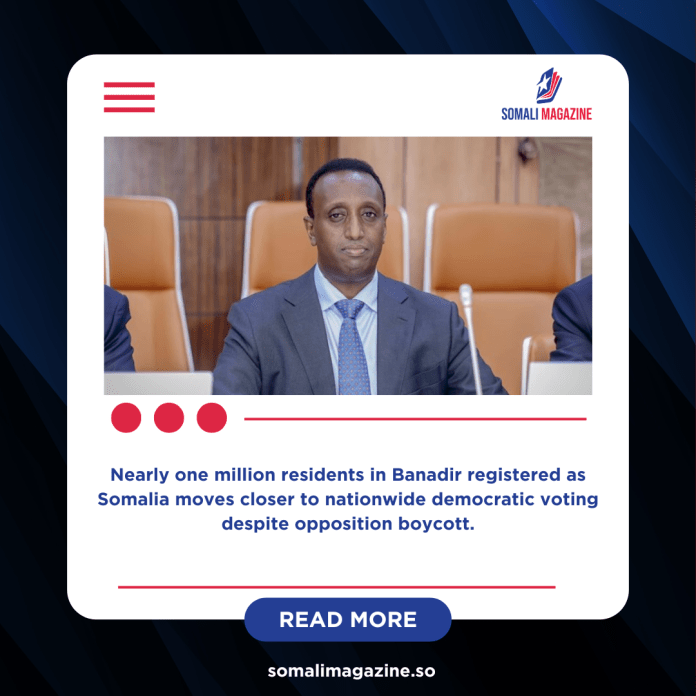Facebook Twitter (X) Instagram Somali Magazine - People's Magazine
The Independent National Electoral and Boundaries Commission (INEBC) has announced that local council elections for the Banadir region will be held in Mogadishu at the end of November 2025. This marks a major step toward the long-awaited one-person, one-vote system, which many citizens have been anticipating for years.
INEBC Chairman Abdikarin Ahmed Hassan said the vote is set for November 30, urging Mogadishu residents to prepare to participate in the election. He confirmed that voter registration in Banadir officially closed on September 30, with nearly one million people signing up to cast their ballots. “On November 30, everyone living in Mogadishu should prepare to vote in the one-person, one-vote local council election, as the registration of the population ended on September 30,” Abdikarin said.
The chairman described the registration process as a significant milestone in Somalia’s ongoing efforts to strengthen its democratic systems. He said that after successfully completing registration in Banadir, the process has now expanded to other districts such as Las Anod in the SSC-Khaatumo region and Hudur in the Southwest State. These areas are part of a broader national initiative to ensure citizens across Somalia have the chance to take part in fair and transparent elections. “The country’s electoral registration process is progressing well. We have completed registration in Banadir’s districts and have now moved on to other regions, including Las Anod and Hudur. We also plan to begin registration in other central districts soon,” Abdikarin added.
The upcoming elections are viewed as a critical test for Somalia’s political maturity and its commitment to democratic governance. For many residents of Mogadishu, this will be their first opportunity in years to vote directly for their local leaders, a development that could reshape how local administration and representation function in the capital. The one-person, one-vote system is expected to enhance accountability and give citizens a stronger voice in local decision-making.
The INEBC chairman also appealed to political organizations to complete the legal steps required to formalize their participation. This includes finalizing their official names and logos, which will appear on the ballots. He encouraged registered voters to stay informed and prepare to choose from among the approved political organizations once campaigning begins.
Despite the progress, not everyone supports the upcoming elections. Opposition parties and two federal member states — Puntland and Jubbaland — have said they will not take part, claiming the process is being controlled unilaterally by the federal government. They argue that the election timeline and management were decided without sufficient consultation, raising questions about transparency and fairness. Their boycott could affect national unity and the inclusiveness of the elections.
Even with these challenges, the announcement has generated excitement among many residents who see the elections as a step toward stability and self-governance. Analysts say successful elections in Mogadishu could build momentum for similar democratic exercises in other parts of the country, strengthening federal institutions and deepening citizens’ trust in the political process.
The federal government and electoral commission maintain that the election will proceed as planned and that all necessary measures are being taken to ensure security, fairness, and transparency. They view the vote as a symbol of Somalia’s progress toward full democracy after decades of conflict and political instability.
As Mogadishu prepares for this historic moment, the focus now shifts to voter education, security arrangements, and political organization readiness. The success of the Banadir local elections could become a model for other regions and a turning point in Somalia’s democratic journey.

